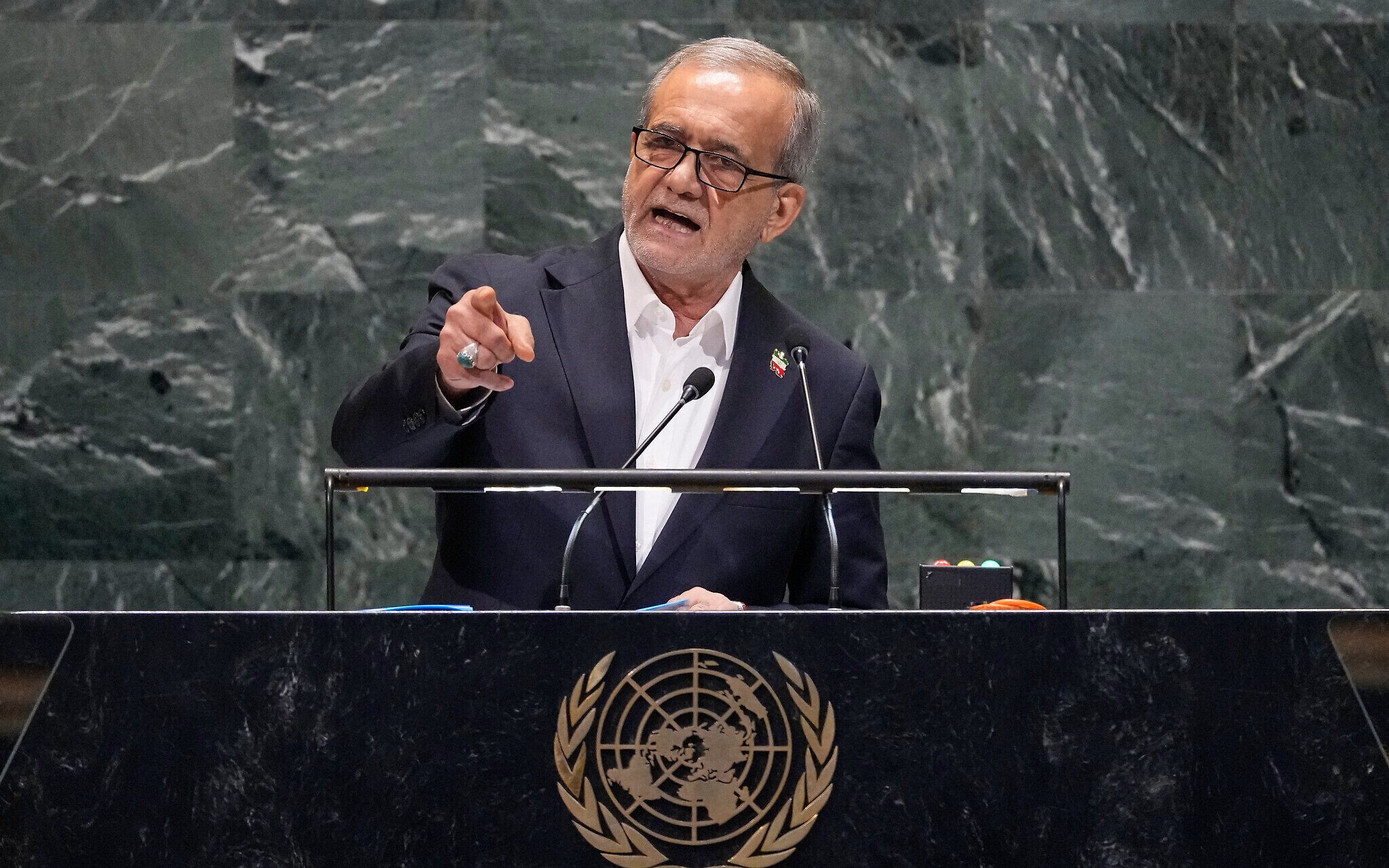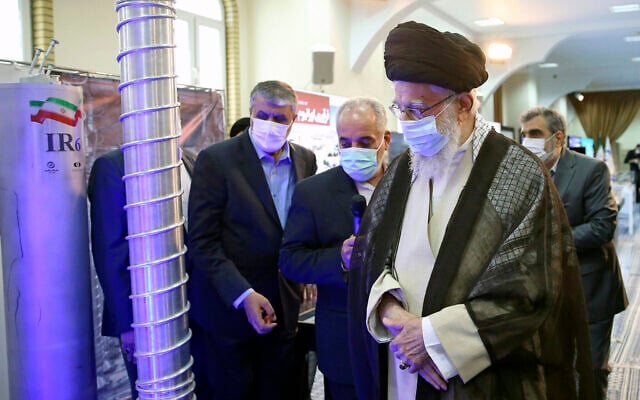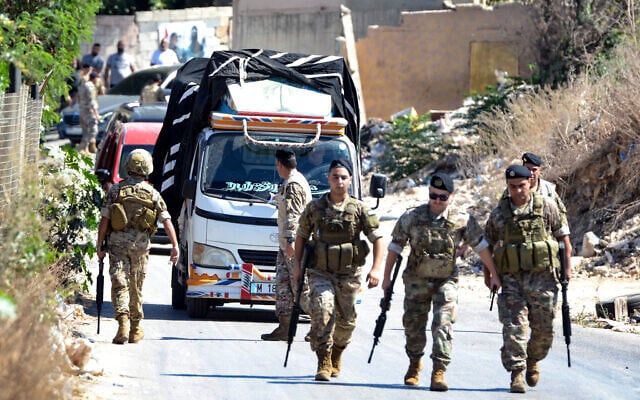


Iran’s President Masoud Pezeshkian vowed Wednesday to “never bow before aggressors,” as his country faces snapback sanctions over its nuclear program and is still reeling from Israeli and US bombings during the 12-day war in June.
Speaking at the United Nations General Assembly in New York, Pezeshkian denied Tehran was seeking nuclear arms, and he slammed “the Zionist regime” over the war in Gaza, as did leaders from Iraq, Lebanon, Morocco and Spain.
Lebanon’s President Joseph Aoun, meanwhile, demanded that Israel cease its strikes and military presence in his country, while Spain’s King Felipe VI claimed pride in the legacy of the Jews his country banished in 1492 as he accused Israeli forces of atrocities in Gaza.
Pezeshkian, in his speech, denounced the “aerial assaults of the Zionist regime and the United States of America against Iran’s cities, homes and infrastructures precisely at a time when we were treading the path of diplomatic negotiations.”
It “constituted a grave betrayal of diplomacy and a subversion of efforts towards the establishment of stability and peace,” he said. “This brazen act of aggression, in addition to monitoring a number of commanders, citizens, children, women, scientists and intellectual elites of my country, inflicted a grievous blow upon international trust and the very prospect of peace in the region. Should we fail to confront such perilous breaches of international norms?”
Pezeshkian’s address to the high-level forum in New York was his first appearance there since the June war, which began with a surprise Israeli strike on Iran’s nuclear program, missile production facilities and military leadership. Iran responded with drone attacks and deadly missile launches.
The war, which abruptly ended weeks-long US-Iran nuclear talks, ended with a US-brokered ceasefire on June 24, two days after the US struck three key Iranian nuclear sites.
Iran’s leaders are publicly sworn to destroy Israel and back a so-called Axis of Resistance regional network of anti-Israel proxies, including Gaza’s Hamas, Lebanon’s Hezbollah and Yemen’s Houthi rebels. Israel has said its June 13 strike on Iran came after the Islamic Republic had taken imminent steps toward nuclear weaponization.
While Iran publicly denies seeking nuclear arms, it has enriched uranium to a level far beyond what is needed for civilian use and a short step away from weapons-grade. The US had demanded in the nuclear talks that Iran give up its enrichment capacities altogether — a demand Tehran rejected.
Speaking at the UN, Pezeshkian said the Islamic Republic was religiously barred from procuring nuclear arms.
“We do not seek nuclear weapons. This is our belief, based on the edict issued by the supreme leader and by religious authorities,” he said.
Iran had been subject to harsh UN sanctions over its nuclear program until a landmark 2015 deal between Iran and world powers.
The US withdrew from the deal in 2018, and the three signatory European nations — France, Germany and Britain — have triggered the deal’s “snapback” mechanism to reimpose the sanctions, accusing Iran of non-compliance. The UN Security Council last week nixed a resolution that sought to block the sanctions being reimposed.
In his speech, Pezeshkian repeatedly accused Israel of genocide in Gaza — a charge Israel has rejected. “At the very least,” Pezeskian said, “over 35,000 innocent civilians in Gaza.”
The figure appeared to refer to the number of women, children and elderly that Gaza’s Hamas-run health ministry has reported. A July report in Hamas-affiliated press agency Safa quoted the health ministry as saying women, children and the elderly constituted over 55% of people killed by Israel in Gaza since war there was sparked when Hamas invaded Israel on October 7, 2023.
At the time of the report, just over 60,000 Palestinians were reported dead. The toll has since risen to over 65,000, according to the Hamas health ministry.
The Hamas figures cannot be independently verified and do not distinguish between civilians and combatants. Israel says it has killed some 22,000 gunmen in Gaza as of August, as well as some 1,600 terrorists inside Israel during the October 7 onslaught.
Pezeshkian went on to denounce the idea of “Greater Israel,” a concept that has been used to describe a Jewish state spanning all or some of Jordan, the West Bank, Gaza, Golan Heights and Sinai Peninsula. Prime Minister Benjamin Netanyahu said last month that he feels connected to the vision, putting the Arab and Muslim world on edge.
In the UN, Pezeshkian said: “The ludicrous and delusional scheme of a Greater Israel is being proclaimed with brazenness by the highest echelons of that regime. The scheme encompasses vast swaths of the region.”
“The map itself lays bare the true intentions of the Zionist regime, intentions that have of late been openly endorsed by its criminal prime minister,” he said. “None in the world is secure from the aggressive machinations of this regime.”
“It is manifest that the Zionist regime and its sponsors no longer even content themselves with normalization through political means,” said Pezeshkian. “Rather, they impose their presence through naked force and have styled it peace through strength. Yet this is neither peace nor power. It is nothing but aggression, rooted in coercion and bullying.”
Pezeshkian met later Wednesday on the sidelines of the UN with French President Emmanuel Macron, who said a deal was possible to avoid restored nuclear sanctions but that only hours were left.
“An agreement remains possible. Only a few hours are left. It’s up to Iran to respond to the legitimate issues we have raised,” Macron wrote on X.
Spain’s King Felipe VI told the UN General Assembly that his country sees with “full severity” violations of international law in “Palestine, in the Gaza Strip.”
Spain has been one of Israel’s harshest critics in the EU and last year joined Norway, Ireland and Slovenia in recognizing Palestinian statehood, infuriating Israel. This year, ahead of the General Assembly, several more Western nations including Britain, France and Canada have recognized Palestinian statehood.
In criticizing the Gaza war, King Felipe alluded to his country’s 2015 law of return for the descendants of Sephardic Jews, meant to redress the “historic mistake” of the Inquisition in which their Jewish ancestors were expelled from the country, forcibly converted or executed, leading to the destruction of what had been one of Jewry’s most prolific and powerful centers.
“Spain is a nation deeply proud of its Sephardic roots,” said the king. “When we speak to the people of Israel, we speak to a people of brothers and sisters, a people who, when they return to Spain, to Cordoba, Toledo, Seville, Barcelona, and so many other places, come home. This was the spirit behind the 2015 law, which was passed with broad consensus, granting Spanish nationality to descendants of Sephardic Jews, originally from Spain.”
“It is for this reason, and it is so difficult for us to understand, and we are so pained by the actions of the Israeli government in Gaza. We therefore cry out, we implore, we demand, stop this massacre now,” he said. “No more deaths in the name of a people that are so wise and ancient, who have suffered so greatly throughout history.”
“Let us be clear, we unequivocally condemn the heinous terrorism of Hamas, especially the brutal massacre of the seventh of October 2023 against the Israeli population. And we recognize Israel’s right to self-defense, but with equal strength, we demand that the Israeli government fully uphold international humanitarian law throughout Gaza and the West Bank,” said the king, calling for a ceasefire and humanitarian aid to be sent into the Strip.
Lebanon’s president on Tuesday called for the “immediate cessation of Israeli aggression” in his country, saying this was necessary for the military to assume full control of the country’s borders.
Aoun, whose election in January ended a two-year impasse in the role, has vowed to uphold a state monopoly on arms — a veiled threat against Hezbollah’s extensive arsenal.
Following the war with Hezbollah last year, Israel has withdrawn from all but five strategic posts in southern Lebanon and continued to carry out strikes against the terror group.
Aoun, in his speech, demanded the “full withdrawal of IDF troops” and “the return of our hostages,” Lebanese nationals detained by Israel during the fighting.
“This will be achieved with the help of the mandate given to [the] United Nations Interim Force in Lebanon (UNIFIL) working in coordination with the Lebanese Army, over a transitional period, to impose peace and stability,” he said. “In this context, allow me to extend my gratitude to the members of the Security Council who adopted the decision to renew the UNIFIL’s mandate, to help us achieve lasting peace and stability.”
Under the November 27 Israel-Hezbollah ceasefire, weapons in south Lebanon were to be held only by the state, and the IDF was permitted to act against imminent threats by the terror group. Israel has since carried out hundreds of attacks on Hezbollah personnel or assets, the vast majority of them in southern Lebanon.
The agreement ended over a year of conflict, which Hezbollah, unprovoked, began on October 8, 2023 — a day after the Hamas onslaught — with near-daily attacks on Israeli border communities, displacing about 60,000 people. In a bid to ensure their safe return home, Israel last September escalated operations in Lebanon, decimating Hezbollah’s leadership.
Aoun also addressed the war in Gaza, calling for “an immediate end to the devastation” there and urging “the revival of a new political track, aimed at finding a just and permanent solution to the Palestinian issue, based on the decisions of the international community and the principle of a two-state solution, ensuring the right of both states to a secure and dignified existence.”
He noted that the principle had been endorsed earlier this month by an overwhelming majority of UN member states, who called for a Palestinian state without Hamas.
Iraq’s President Abdul Latif Rashid told the UN General Assembly on Tuesday that the treatment of Palestinians by Israel is “inhumane” and a “disgrace.”
“The Palestinian civilians are beset by killing, starvation, displacement, and the destruction of infrastructure and state institutions. This is inhumane. It’s a disgrace for humanity. Therefore, this must end,” he said, calling for the international community to take “urgent measures” to ensure a solution to the Palestinian issue.
“This, and the establishment of an independent State of Palestine, is the only pathway to stability and security in the Middle East and the entire world,” he said, adding that the treatment of Palestinians is proof of the world’s “selectiveness” when protecting human rights.
Moroccan Prime Minister Aziz Akhannouch also called Tuesday for a ceasefire and entry of humanitarian aid to Gaza, saying his nation “stands in solidarity” with Middle Eastern countries that have been attacked by Israel.
Akhannouch urged the United Nations to work to “save the region from the cycle of violence,” and outlined steps to bring peace between Israel and the Palestinians.
“One, an immediate ceasefire (in Gaza) and a return to the negotiating table in order to put a final end to the war. Two, ensuring the entry of humanitarian assistance to the Gaza Strip and the West Bank without any conditions or restrictions. Three, promote the vital role of UNRWA,” the UN agency for Palestinian refugees, which Israel has accused of cooperating with Hamas. “And four, implement a clear and comprehensive roadmap for reconstruction,” said Akhannouch.
“We continue to believe that the two-state solution is the only way to achieve sustainable and comprehensive peace in the Middle East,” he said, adding that such a process cannot be delayed.
Morocco is one of a handful of Arab nations that recognized Israel in 2020 as part of the US-brokered Abraham Accords.




